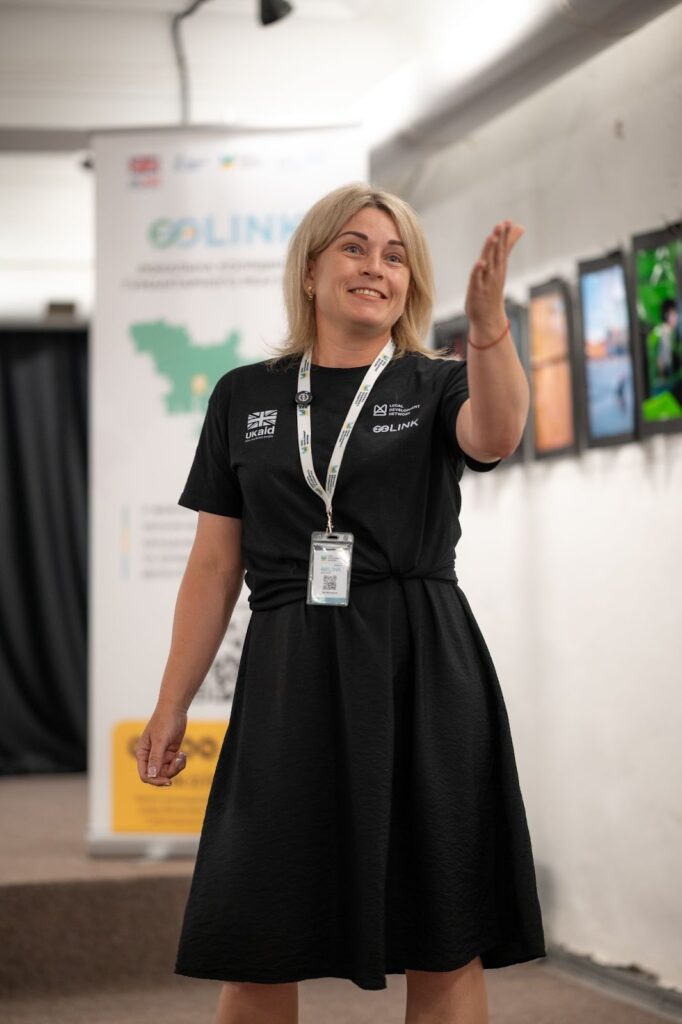“In court, they tried to convince me that the person advising me was incompetent” — how Link helps resolve legal issues
Publication date: November 12, 2025
While collecting and verifying humanitarian needs in the de-occupied communities of southern Ukraine, specialists from the Link local coordination mechanism identified a significant demand for legal assistance among residents.
As a result, in 2024 the legal component of Link was launched — focused on collecting and verifying legal needs, providing legal information, and referring cases to partner organizations. This work is carried out in cooperation with the Czech humanitarian organization People in Need and funded by the UK Government.
One of the most common legal requests involves civil law matters, particularly inheritance.
Borys, a resident of the Vysokopilska community in Kherson oblast, turned to Link’s humanitarian response lawyer, Natalia Yurchenko, for advice regarding the inheritance of his late aunt’s apartment. The notary whom Borys had initially contacted refused to open an inheritance case, citing that the death certificate was of Russian origin — since the aunt had died in the Russian Federation.
“My aunt lived in Velyka Oleksandrivka in Beryslav district. We were very close — she was my father’s sister and also my godmother. When the Russian occupation began, we were cut off from each other. I couldn’t evacuate her — the roads were mined, there was no connection. She was 80 and used crutches. Volunteers took her to Crimea, and from there her daughter, who lives in Moscow, brought her to Russia. A year later, she passed away there,” says Borys.
Currently, Ukraine has no agreements with Russia regarding the exchange or legalization of documents. This became the reason for the notary’s refusal. The notary advised Borys to go to court to establish the fact of death.
To assist with the documentation, Link’s humanitarian response lawyer Natalia Yurchenko referred Borys to the Ukrainian Helsinki Human Rights Union (UHHRU) Reception Office in Kherson. The partners helped him prepare the necessary application and submit it to the court.
However, instead of the usual 7–10 days typical for such cases, the process in one of the Kherson district courts lasted four months.
“They refused to issue a death certificate, arguing that my aunt hadn’t died in an occupied territory but in Russia. They told me to go back to the notaries — a vicious circle,” recalls Borys.
Throughout several months of court hearings, Link’s lawyer Natalia Yurchenko stayed in touch with Borys, consulting him by phone. The case was resolved only after the inclusion of Supreme Court practice.

Link Humanitarian Response Lawyer, Natalia Yurchenko
“The case law of the Supreme Court of Ukraine shows that it is possible to establish the fact of a Ukrainian citizen’s death abroad — even in a country with which Ukraine has severed all document exchange agreements,” explains Natalia Yurchenko.
After that, the court ruled in favor of Borys. The next procedural step was to apply to the civil registry office (DRACS) to obtain a death certificate. Yet, the local registry office refused to accept the court decision, despite the fact that under civil procedural law such court rulings must be executed immediately.
“We understood it would be difficult to continue with them, so we advised the client to apply to another district registry office,” says Natalia Yurchenko.
In another Kherson district, the DRACS accepted the application and court ruling without any issues, processed it within a day, and issued the death certificate. After that, Borys was finally able to open the inheritance case with a notary.
“In court, they tried to convince me that the person advising me was incompetent, that nothing would work out anyway. But Natalia Yurchenko’s strong arguments prevailed,” Borys says.
Today, Borys has already applied to the notary and is awaiting the documents needed to formalize the inheritance.
The referral was carried out by the Legal Development Network in cooperation with the Czech humanitarian organization People in Need and with funding from the UK Government.
The opinions, interpretations, and conclusions expressed in this material are those of the authors and do not necessarily reflect the views of the project’s donors or partners.
|
Отримайте поглиблену консультацію через чатбот LawLink
|
P. S. In June 2024, the Legal Development Network (LDN) launched a crowdfunding campaign, Recovery of The South of Ukraine , as part of the crisis response program #StandWithUkraine.
You can Recovery of The South of Ukraine |
If you have notices an error on the web-site, please, highlight the text and press ctrl-enter.
Have you found your solution? Help others!
Print a poster
Print and place the Network's poster on a notice board in your entrance hall
Become a volunteer
Become a volunteer and assist others in finding problem solutions
Do you need a consultation ?
Online chat
Ask question and one of the LDN's lawyers
will answer it.
Chat's schedule: from 10 to 16
every day
Chatbot
Ask questions via LawLink Bot in any convenient way. LawLink Bot is a smart and digital legal assistant created by the Legal Development Network.

Our initiatives
The Legal Development Network implements comprehensive projects aimed at strengthening human rights, developing capable communities, and building sustainable tools for access to legal aid. We work at the intersection of advocacy, legal education, and local coordination of humanitarian response.
